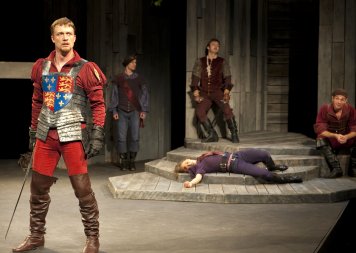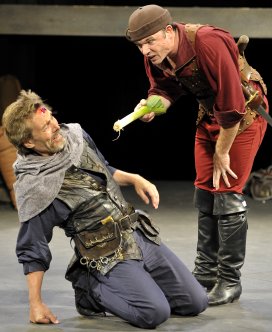Summary 
Solid outdoor production, directed with imaginative flair but with just a single prop - Henry's throne - and a half-modernized costume design with emphasis on denim and blue jeans. Heavy use of doubling by a supporting cast of twelve directs focus upon a commanding Henry, and some roles are played by a performer of the opposite sex. Interesting choices and a powerful core performance, and while the overall effect is entertaining, all the design decisions do not cohere into a particular theme or tone.
Design
Directed by James Bohnen. Costumes by Fabio Toblini. Set by Takeshi Kata. Lights by Michael A. Peterson. Sound and original music by Josh Schmidt.
Cast
Matt Schwader (King Henry V), James Ridge (Chorus/Bedford/Ely/Burgundy/Bourbon), Tim Gittings (Gloucester/Grey/Alice), Steve Wojtas (Exeter/MacMorris/Le Fer), David Daniel (Westmoreland/ Fluellen), Kenneth Albers (Archbishop/Governor of Harfleur), Nicholas Harazin (Cambridge/Gower), Paul Hurley (Scroop/Williams/Lewis), Paul Bentzen (Bardolph/Erpingham/ Charles VI), Jonathan Smoots (Pistol/Constable), Michael Huftile (Nym/Montjoy), Catherine Lynn Davis (Queen of France/Mistress Quickly/Orleans), Carrie A. Coon (Katherine/Boy).
Analysis
James Bohnen's spare Henry V is staged with just a single prop - the king's throne - the focus intense upon Matt Schwader as King Henry. The array of minor characters, played by a relatively small supporting cast of twelve performers, is accomplished with ample doubling, so the similar faces behind Schwader's handsome Henry become familiar, intensifying the singularity of the King's character. The ensemble works hard: Exeter and Westmoreland counsel the King in early scenes, then the actors reappear as MacMorris and Fluellen in the mines; the traitors Cambridge and Scroop become Gower and Williams outside Harfleur; and Bardolph and Nym become the French King and herald Montjoy in the next scene, while Mistress Quickly and the unnamed Boy reappear as Orleans and Katherine.
Bohnen's use of his cast is remarkable, with a purple-clad Chorus emerging from mid-audience to deliver the pre-performance admonitions ("no cell phones!"). The Chorus descends to the stage, then turns as the ensemble assemble behind him, and he delivers the story's apologetic prologue, sharing the concluding lines with each member of the ensemble in turn. The Chorus takes several roles as well as his occasional explanatory soliloquies: to open the play 1.1 he dons the robes of the Bishop of Ely and bears the Archbishop's impressive tome; he appears before 2.1 as the news of Falstaff's illness is told, and he points out the traitors plotting against the King; he stands center stage before the 3.1 siege of Harfleur; he helps dress Katherine's attendant Alice before 3.4; after an intermission he sadly watches the 4.1 march of the weary and sickened troops before accepting a soldier's cloak to become the King's brother, Bedford; and after the victory at Agincourt, the Chorus stands alone onstage amid plaintive music to describe the subsequent losses.
Bohnen's stage remains bare throughout the production, the lack of onstage props following the Chorus's urging for the audience to employs its imagination to summon the play's events as well as helping maintain focus on Henry himself. Bohnen bends gender in his casting, and the strong performances overcome any sense of oddity to enhance the production. A male actor perfectly portrays Princess Katherine's prim lady-in-waiting Alice, and the actress portraying Katherine herself doubles as Falstaff's Boy, excelling in "his" wry observations regarding Falstaff's tavern mates. And the actress portraying Mistress Quickly delivers a wrenching 2.3 eulogy - "Falstaff is dead" - before morphing into one of the insufferable French braggarts - Orleans - during subsequent scenes. Another oddity - costume design with heavy emphasis on denim, the characters attired in modern jeans coupled with fifteenth-century doublets - plays less successfully. The other distinctive choices - doubling of roles, a single prop on a barren stage, gender-bent casting - play seamlessly within the production, but the image of soldiers and citizens in the early 1400s wearing casual modern blue jeans is a bit disconcerting, the seemingly half-finished design more a distraction than an enhancement.

But the play is about the commanding presence of King Henry, and Schwader dominates Bohnen's production. Trim and fit, young and handsome, stately and dignified, his Henry is far more Olivier in 1944 - bemused, confident, righteous - than Branagh in 1989: an uncertain, oft-manipulated man of the people. Schwader's Henry stands apart from the beginning, shown in the balcony reflecting on the words of Falstaff from the Henry IV plays, his tight cinnamon-red doublet open to reveal his chest, wearing thigh-high black leather boots, a golden crown firmly upon his head. Handsome and articulate, Schwader's Henry wears a closely clipped goatee, and he is brightly lit and mostly center stage throughout the production. When the Archbishop enters to discuss the potential of war against France, Henry remains upstage, at the center of a cluster of advisors, but clearly above the Church's influence, both figuratively and literally. Schwader's Henry seems amused by the Archbishop's claims, even as Canterbury flings books to the courtiers around him, and he calmly rises from his throne to rebuke the smirking Montjoy after the insult of the "ton of treasure," tossing one of the tennis balls far offstage.
Schwader's Henry, with the family Welsh coat of arms upon his doublet, stands at the core of a series of strong scenes. During the 2.2 interaction with his traitorous supposed-friends, he displays calculating cool, then rising ire in bitter irony - "I know your worthiness" - and finally indignant fury, as he throws Cambridge down to one knee. At Harfleur, he thrusts himself into his beleaguered soldiers, rousing them to their feet - "once more unto the breach!" - then leads them off against the city gates in a shouting swarm. Schwader's Henry sadly reflects during 3.6, resolute with but pained by his decision to have Bardolph hanged by the neck for his thievery of a French church. And following the memorable "we few, we happy few, we band of brothers" speech, Henry rallies the soldiers amid the ominous rumble of approaching French horses, driving them to a battle cry with his spirited "For England!" Finally, his command to "kill the prisoners!" comes as a shockingly brutal tactic, unprovoked and extreme, albeit in the heat of a chaotic battle.

While Bohnen's disparate directorial choices may not all come together in a unified whole, his direction of Schwader propels the production, and Bohnen provides a slew of intriguing scenes and images that bolster the entertaining overall vision. The scheming Archbishop of Canterbury is a big walrus of a man in a red skull-cap and robe, a gold crucifix prominent on his chest. Pistol and Nym wear boots and hats with earflaps as they duel with knives, their appearance illustrating their character: they limp, one hunch-backed, the other one-eyed and squinting. Fluellen follows the charge against Harfleur, but returns to chase the Boars' Head tavern hounds into battle, beating back their attempted desertion with a big stick. Bohnen's eye for detail, even in the smallest of moments, impresses: the Mayor of Harfleur crushes the letter from the Dauphin in his hand and sags in defeat; Katherine's servant Alice playfully meows and slashes "her" nails like a cat; and Montjoy's unconditional surrender comes after a slow trudge down an aisle through the audience.
Bohnen's closing moments, while undeniably audience-pleasing, are a sudden change of tone, almost a reach for romantic comedy. The gallant and boyish King - moments from a depiction of his leadership on a battlefield littered with thousands of dead and maimed soldiers - pursues the Princess like a schoolboy in the throes of a pre-teenaged crush. Struck by her presence, he speaks of her as a capital demand until the Dauphin releases his grip of her hand. He woos her with fervor - "take a king, take a soldier" and "we are the makers of fashion" - but with a surprisingly uncharacteristic lack of confidence: "here comes your father!" Moments later, a gallant Schwader leads his supporting cast - like Henry leading his countrymen - back onstage for the curtain call.